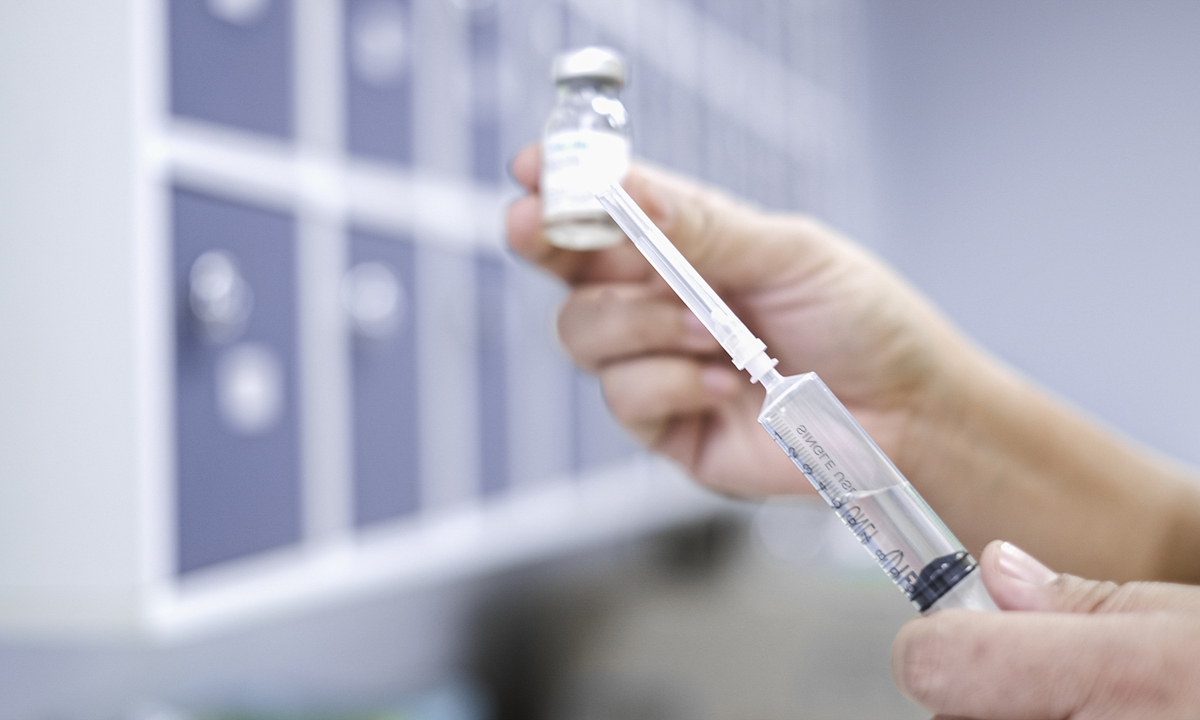gloveharicut
GLOVE Shareholders read this "COVID-19 vaccine may be unable to prevent second infection"
gloveharicut
Publish date: Tue, 25 Aug 2020, 03:25 PM
{{{PM me to join GLOVE Private Discussion Room}}}
I invite you to read my blog and make a smart GLOVE decision.
https://klse.i3investor.com/blogs/gloveharicut/blidx.jsp
I am reproducing Global Times article to my blog.
This post don't have any value added content.
Compile here for my own record.
Please skip if you don't like it.
https://www.globaltimes.cn/content/1198767.shtml
COVID-19 vaccine may be unable to prevent second infection after several months: HK virologist
By Zhang Hui and Liu Caiyu Source: Globaltimes.cn Published: 2020/8/25 11:30:43

vaccine Photo:VCG
The COVID-19 vaccine that countries around the world are racing to acquire may not be able to provide permanent protection, and recipients who recover from the infection may become reinfected even after getting the COVID-19 vaccine, a Hong Kong virologist told the Global Times after a recent study in Hong Kong found the world's first case of reinfection after recovery.
Researchers from the University of Hong Kong's Department of Microbiology said genetic sequencing of the novel coronavirus showed that a Hong Kong man was infected a second time by completely different strains of the virus four months after he was initially infected, Hong Kong media reported on Monday.
The 33-year-old man was hospitalized after becoming infected with the virus in March and was discharged on April 15. He then travelled to Spain in August via London, and tested positive again after returning to Hong Kong.
Hong Kong researchers said they found antibodies several days after the man was hospitalized for the second time, but there were no antibodies when he tested positive after returning from Spain, which also proved that he had been reinfected and could therefore infect others. This case was believed to be the world's first confirmed case of a human becoming reinfected after recovery.
Jin Dongyan, a biomedical professor at the University of Hong Kong, told the Global Times on Tuesday that genetic sequencing of the man's virus during his first infection was similar to the virus detected in Wuhan, Central China's Hubei Province, when he was first diagnosed with COVID-19 in March. This time, the sequencing was similar with the virus found in Europe.
Jin also ruled out the possibility that the virus from March had remained in his body, thus bringing a positive test result, due to the completely different genetic sequencing of the virus. Most of those who test positive due to the virus remaining in their bodies shortly after they are cured do not infect others, but in this case, the man, although a silent carrier, could infect other people, Jin said.
Microbiologist Yuen Kwok-yung from the University of Hong Kong told the Global Times on Tuesday that the second infection has less symptoms or no symptoms in this case, but the viral load in the patient body is just as high as in any acute infection, meaning that the reinfected patient can be just as infectious as a patient who is infected the first time.
As the antibodies found in patients cured from the virus have a much better protective effect than COVID-19 vaccines in preventing them from being reinfected, the case showed that COVID-19 vaccines may fail to protect these recipients from being infected a second time, Jin said.
The case reminded people that vaccines are not a once-and-for-all solution, and they most likely can only protect them from getting serious symptoms, and scientists have to keep researching and properly respond to this issue, according to Jin.
He said that experts are still investigating whether this is an isolated case or if it indicated that most patients who are cured could be reinfected.
Yuen said that as the reinfection case has no symptoms, even if there are many reinfection cases around the world, they may not be tested at all, which means it is still too early to judge if it is an individual case or a global trend.
Yuen said follow-up studies will be required to see if those infected and those who are vaccinated can gain long-term protection.
Previous studies have shown that antibodies in patients who are already cured cannot last long.
According to a recent study by Chongqing Medical University experts that was published in Nature in June, about 81 percent of asymptomatic carriers and 62 percent of symptomatic COVID-19 patients showed a decrease in antibodies two months after they were discharged from hospitals.
A study conducted in Shanghai revealed that the level of comprehensive antibodies in most recovered patients was significantly reduced in the third week, and 10 of the 175 patients did not even produce comprehensive antibodies, said Lu Hongzhou, co-director of the Shanghai Public Health Clinical Center at Fudan University.
Regarding the Hong Kong case, Lu said that more data is needed to prove whether it's just a positive nucleic acid result or actually an active virus.
Lu added that there is no need to be anxious, as extended immunization times of other coronavirus, such as SARS and MERS, for patients who had been cured turned out to be longer than four months.
Posted in: HK/MACAO/TAIWAN
More articles on gloveharicut
TOPGLOV 4QFY22 Briefing slides - good time to bottom fishing?
Created by gloveharicut | Sep 20, 2022
CIMB: BUY DKSH. Target RM5.30. Beat expectations on strong margins
Created by gloveharicut | Aug 30, 2021
HARTA 2021 Q4 Briefing Slide - Differentiate from others by growing a truly sustainable business
Created by gloveharicut | May 04, 2021
GLOVEs to stay in limelight amid resurgence of Covid-19 cases
Created by gloveharicut | Apr 19, 2021



















PureBULL ...
By supermxmx, 3:01 PM
Bloomberg - Indian tech group withdraws from vaccine race saying not worth it (12:58 p.m. HK)
A group of Indian Institute of Technology alumni and academics has withdrawn from the vaccine development race. It’s neither viable nor safe to do such research at a hectic pace and with inadequate data, IIT Alumni Council said in an Aug. 24 statement.
Only 2% of Covid-19 patients need critical care and they can most likely be treated with antibody-based biologics, Daljit Singh, an IIT alumnus and former president at Fortis Healthcare said in the statement. A vaccine, on the other hand, will need to protect nearly the entire population in order to be effective.
“Chasing 2% of the population with a 98% sure cure has a far better probability of success than chasing 98% of the population with a 2% surety of safety and efficacy,” he said.
2020-08-25 15:27